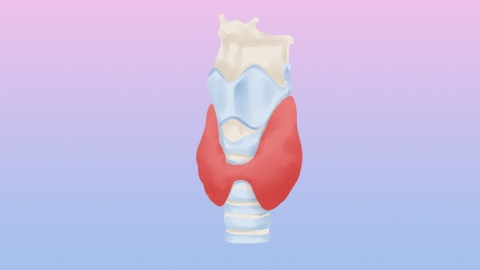What Should Patients with Thyroid Nodules Avoid Eating?
Generally, patients with thyroid nodules should avoid eating foods such as kelp, nori, dried sea fish, iodized salt, and spicy kimchi. They should also refrain from self-medicating with the following medications: dexamethasone acetate tablets, prednisone acetate tablets, clobetasol propionate cream, lecithin-bound iodine capsules, and potassium iodide tablets. Detailed explanations are as follows:
1. Kelp
Dried kelp contains about 2400 micrograms of iodine per 100 grams, making it a high-iodine food. Iodine is a raw material for synthesizing thyroid hormones. Excessive iodine intake may stimulate thyroid tissue, affect the balance of thyroid hormone secretion, potentially worsen nodule conditions, or interfere with the assessment of nodule characteristics, especially harmful for patients with concurrent thyroid dysfunction.
2. Nori
Dried nori contains approximately 1800 micrograms of iodine per 100 grams, which is extremely high in iodine content. Consuming nori may lead to excessive iodine intake in patients with thyroid nodules, possibly causing thyroid hormone synthesis disorders and increasing the risk of thyroid tissue proliferation, which is not conducive to the control and management of nodules.

3. Dried Sea Fish
For example, cod fish contains about 100 micrograms of iodine per 100 grams. Although lower than kelp and nori, it is still considered a moderately high-iodine food. Long-term excessive consumption may cause iodine accumulation in the body, potentially affecting normal thyroid function and adversely impacting the stability of nodule conditions, particularly requiring avoidance of frequent consumption.
4. Iodized Salt
If patients with thyroid nodules do not have iodine deficiency and are not concurrently suffering from hypothyroidism, long-term consumption of iodized salt may lead to excessive daily iodine intake. Excess iodine can stimulate the thyroid, possibly promoting nodule growth or affecting thyroid hormone metabolism. These patients may choose non-iodized salt under a doctor's guidance.
5. Spicy Kimchi
Spicy kimchi often contains a large amount of added salt during preparation, and some may contain iodine. The spicy components may irritate the surrounding thyroid tissue, potentially causing local discomfort; high salt diets may affect body metabolism, indirectly adversely affecting thyroid function, which is not beneficial to the overall health of patients with thyroid nodules.
II. Medications
1. Dexamethasone Acetate Tablets
These belong to glucocorticoids, primarily used for anti-inflammatory and anti-allergic purposes. Patients with thyroid nodules without clear indications taking this medication may suppress immune system function, potentially concealing nodule-related symptoms, delaying diagnosis, and possibly causing side effects such as elevated blood sugar and osteoporosis.
2. Prednisone Acetate Tablets
Also a glucocorticoid, like dexamethasone acetate tablets, commonly used for treating autoimmune diseases. Patients with thyroid nodules taking this unnecessarily may interfere with normal immune regulation, possibly affecting the normal repair of thyroid tissue and potentially causing adverse reactions such as weight gain and elevated blood pressure.
3. Clobetasol Propionate Cream
This is a topical glucocorticoid used to treat skin diseases. If applied to the skin over the thyroid area, the drug components may be absorbed through the skin, and long-term use may affect the local endocrine environment, indirectly adversely affecting thyroid function and不利于nodule stability.
4. Lecithin-Bound Iodine Capsules
The main component is iodine, used to treat fundus diseases. Patients with thyroid nodules taking this may result in excessive iodine intake, stimulating thyroid tissue, disrupting the balance of thyroid hormone synthesis and secretion, possibly worsening nodule conditions and inducing thyroid dysfunction.
5. Potassium Iodide Tablets
Used for the prevention and treatment of iodine deficiency disorders. Patients with thyroid nodules without iodine deficiency taking this may cause excessive iodine levels in the body, stimulating thyroid tissue proliferation, potentially leading to nodule enlargement and possibly triggering hyperthyroidism or hypothyroidism.
In daily life, patients should maintain regular作息, avoid excessive fatigue, and have regular check-ups for thyroid function and nodule status. If discomfort occurs, timely medical attention is necessary, and adjustments to diet and medication should be made under a doctor's guidance. Self-determination of diet or medication should never be done without professional advice.




